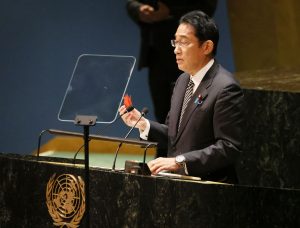Prime Minister Kishida Fumio is facing mounting pressure to investigate dubious links between ruling party politicians and the Unification Church. Kishida is in the hot seat for refusing to re-investigate party members for allegedly accepting “policy recommendations” from the religious group weeks after ordering a probe into allegations of illegal activities undertaken by the church.
In the wake of former leader Abe Shinzo’s assassination in July, the Unification Church’s political influence within the ruling Liberal Democratic Party (LDP) has come under the public microscope. The alleged assassin told police he targeted the former prime minister over Abe’s ties to the religious group.
The government will investigate allegations that the Unification Church, which critics call a cult, forces members to donate huge sums of money and purchase spiritual goods at exorbitant prices. But Kishida has rejected calls from the opposition camp to re-investigate his party members for signing Unification Church policy proposals.
The Unification Church scandal has become a major liability for the Kishida administration. In an effort to clean out lawmakers with ties to the group, Kishida reshuffled his cabinet in August. This was followed by a survey of LDP lawmakers’ links with the Unification Church, in which 179 out of 379 members disclosed having interactions with the group. But some members of the reshuffled cabinet also have ties with the church, undermining Kishida’s internal probe to prove the Unification Church does not influence the government.
The relationship between the LDP and the Unification Church has been described as a “bottomless pit,” with party members’ ties to the religious group coming to the surface only when they can no longer be denied. The opposition camp is criticizing Kishida for his slow response in reprimanding the economic revitalization minister after he failed to explain his relationship with the Unification Church. They also point out that the relationship between the late Abe Shinzo and the church was not investigated along with other prominent LDP politicians, allowing them to operate with impunity.
However, the government defended LDP members by saying that in the lead up to elections lawmakers regularly receive proposals from various organizations. Kishida explained it was the responsibility of members to individually explain their ties to the church.
The government has been struggling to strike a balance between managing public criticism and fulfilling his election promise to enliven and bring transparency to domestic politics. Kishida became the new face of the ruling LDP when he won the party’s internal presidential election in September 2021. During the general election campaign the next month, Kishida pledged to restore public trust in politics. He stated, “The nation’s democracy is in crisis as public trust in politics, the foundation of democracy has seriously eroded.”
But after 12 months in office, amid the unfolding Unification Church scandal Kishida’s approval rating has plummeted to a dangerous low of 29 percent in September from a peak of roughly 60 percent in July.
As the Kishida administration struggles to calm public scrutiny, Japan is battling inflation that has hit a 30 year high of 3 percent. Kishida is under immense pressure to show leadership and cushion the cost of living crisis. Global supply chain pressures and Japan’s falling yen against the dollar as a result of the widening gap in interest rates between the United States and Japan is exacerbating the problem. Bank of Japan Governor Kuroda Haruhiko’s determination to maintain monetary easing championed by the former Abe administration is also a factor behind the depreciation of the yen.
Last year, Kishida vowed to double incomes and correct widening income disparity. He has been urging employers to increase wages to match inflation albeit with varying degrees of success. As winter approaches, the Kishida administration’s success in managing the economy and unification church scandals will determine Kishida’s political longevity.

































